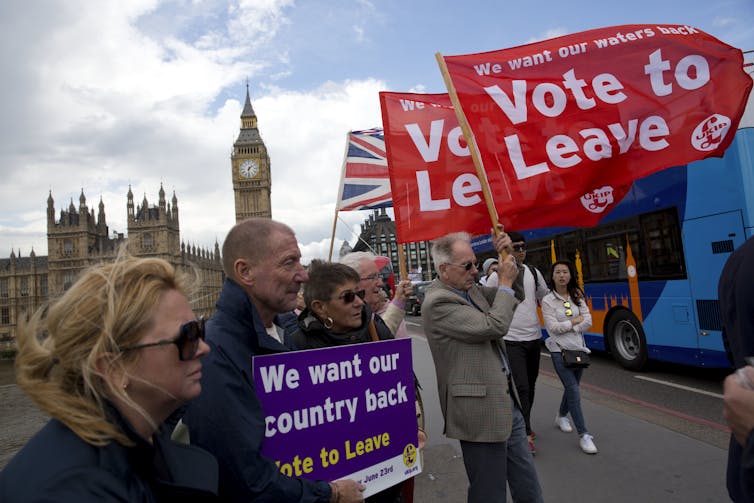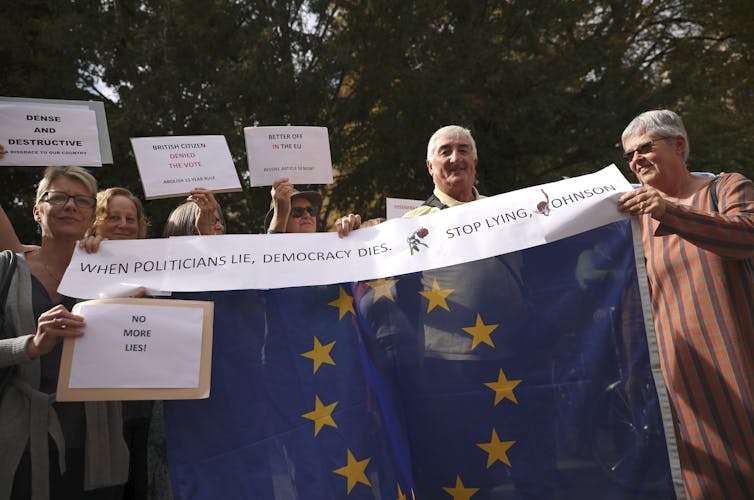How does the 'unidentified political object' that is the European Union really work?
- Written by Garret Martin, Professorial Lecturer, American University School of International Service
In the run-up to the 2016 Brexit referendum in the United Kingdom, “Take our country back”[1] became a rallying slogan for the campaign pushing for the U.K. to leave the European Union.
Opponents of further integration of the U.K. into the EU resented what they saw as the growth of EU powers over the years, believing it infringed excessively on the power of the U.K. to control its own destiny.
As evidence, so-called “Leave” supporters often erroneously claimed that 60% of U.K. laws were actually imposed from Brussels[2], the headquarters of EU institutions. Or they denounced the EU as being run by “unelected bureaucrats[3].”
The European Union is a political and economic union formed in 1993[4]. It built upon previous institutions which had been promoting European integration since 1951. When it was established, it was a new form of political organization for Europe that did not fully resemble traditional political models. The EU is neither a centralized state, like France, nor is it a federation, like the United States.
And that elusive nature has made it hard to understand, even for those who closely study it like myself. Jacques Delors, a former president of the European Commission, the executive arm of the EU, once described the European Union as “an unidentified political object.”[5][6]
Its complexity has also led to misconceptions, especially regarding the sensitive question of the division of powers between the EU and its member-states. Those misconceptions also played a part in the current government chaos in the U.K.[7] as it fast approaches the Oct. 31 deadline to leave the EU.
 Supporters of the U.K. leaving the EU demonstrate outside the Houses of Parliament in London, June 15, 2016.
AP/Matt Dunham[8]
Supporters of the U.K. leaving the EU demonstrate outside the Houses of Parliament in London, June 15, 2016.
AP/Matt Dunham[8]
Division of powers
After World War II, a small number of European countries initiated a program of deeper cooperation in the pursuit of peace and economic prosperity[9].
Six founding members first created the European Coal and Steel Community in 1951[10], pooling together these two key resources. Six years later, they established the European Economic Community[11], which aimed to promote deeper economic integration. In the following decades, these institutions which eventually became the EU grew in scope and in membership.
This increased importance has allowed the EU to pass some very consequential laws, affecting the lives of citizens across the Union. Thus, free movement of labor, limiting the legal work week to no more than 48 hours, or allowing a right to be forgotten on the internet, are all the result of EU laws[12].
The EU has carved out greater responsibilities over the decades, but these are not absolute. Member-states remain influential and still protect key elements of their sovereignty. And a dense system of checks and balances, as Professor Hussein Kassim points out[13], ensures no actor within the EU can impose its preferences unilaterally.
Member-states have delegated more sovereignty over time to the EU. But they have done so within well-defined limits. The 2007 Lisbon Treaty[14] clarified the division of powers between the EU and member states.
It distinguished three major types of “competences,” which are powers in EU parlance: exclusive, or areas where only the EU can act, such as monetary policy for Eurozone countries; shared, where member states can pass laws if the EU has not done so, such as energy policy; and supporting, where the EU can only supplement member state actions, such as in education and culture.
Yet, even in areas of exclusive competence such as trade relations with non-EU countries[15], the EU is subject to many levels of review. The Council of Ministers, representing the 28 member states, must first agree on a negotiating mandate. Only then can the European Commission, the executive body of the EU, start talks with other parties. And once the Commission signs a trade agreement, it must still be ratified by the Council and the European Parliament, a legislative branch of the EU whose members are directly elected by EU citizens.
 Pro-EU demonstrators hold a banner and an EU flag prior to the arrival of European Commission President Jean-Claude Juncker and British Prime Minister Boris Johnson in Luxembourg, Sept. 16, 2019.
AP/Francisco Seco[16]
Pro-EU demonstrators hold a banner and an EU flag prior to the arrival of European Commission President Jean-Claude Juncker and British Prime Minister Boris Johnson in Luxembourg, Sept. 16, 2019.
AP/Francisco Seco[16]
Accountability
The claim that the EU is run by “unelected bureaucrats” is misleading[17].
The main target of this claim, the 28-member European Commission, certainly plays an important role in the day-to-day management of the EU.
The Commission proposes legislation for review by other key institutions, especially the Council and the European Parliament. It also manages the EU budget and ensures compliance with EU law. This means it can refer states suspected of non-compliance to the European Court of Justice.
It also relies on its more than 32,000 staff members and a leadership not directly elected by EU citizens.
But this leadership is supervised by member-states[18]. It is the EU Council, representing the heads of government of member states, that proposes a candidate for president of the Commission.
Additionally, each member state gets to nominate one commissioner. And the whole Commission needs to be approved by the European Parliament, whose members are directly elected by European citizens. In the latest European Parliament elections in May 2019, for instance, 50.6% of the more than 400 million eligible voters turned out to vote[19].
Input required
Finally, passing any EU law requires the Commission to seek input from other key actors, including member states. It is a complex process that involves compromise and consulting with all responsible institutions[20].
True, only the Commission can propose legislation. Once it does so, however, the national parliaments of member states have a mechanism to express reservations, which could lead the Commission to shelve its proposal.
If the proposal does pass this step, it still needs to be adopted by both the Council, representing member states, and the European Parliament. This gives either of those institutions veto power. And even when an EU law is passed, it will still be up to the various national authorities to implement the legislation.
It is a complex process. But it is also one that seeks to serve EU citizens, not undermine the sovereignty of member-states. This was well evidenced by the 2017 law on scrapping roaming charges[21]. Thanks to a multiyear effort, EU citizens were no longer subject to expensive costs when they used their cellphones in countries other than their own.
[ Like what you’ve read? Want more? Sign up for The Conversation’s daily newsletter[22]. ]
References
- ^ “Take our country back” (www.independent.co.uk)
- ^ 60% of U.K. laws were actually imposed from Brussels (theconversation.com)
- ^ “unelected bureaucrats (www.express.co.uk)
- ^ political and economic union formed in 1993 (europa.eu)
- ^ even for those who closely study it like myself (theconversation.com)
- ^ “an unidentified political object.” (archive.nytimes.com)
- ^ current government chaos in the U.K. (www.bloomberg.com)
- ^ AP/Matt Dunham (www.apimages.com)
- ^ deeper cooperation in the pursuit of peace and economic prosperity (www.cfr.org)
- ^ European Coal and Steel Community in 1951 (www.britannica.com)
- ^ European Economic Community (europa.eu)
- ^ are all the result of EU laws (www.independent.co.uk)
- ^ as Professor Hussein Kassim points out (ukandeu.ac.uk)
- ^ 2007 Lisbon Treaty (eur-lex.europa.eu)
- ^ such as trade relations with non-EU countries (www.consilium.europa.eu)
- ^ AP/Francisco Seco (www.apimages.com)
- ^ is misleading (blogs.lse.ac.uk)
- ^ supervised by member-states (blogs.lse.ac.uk)
- ^ 50.6% of the more than 400 million eligible voters turned out to vote (election-results.eu)
- ^ complex process that involves compromise and consulting with all responsible institutions (ukandeu.ac.uk)
- ^ the 2017 law on scrapping roaming charges (www.bbc.com)
- ^ Sign up for The Conversation’s daily newsletter (theconversation.com)
Authors: Garret Martin, Professorial Lecturer, American University School of International Service

